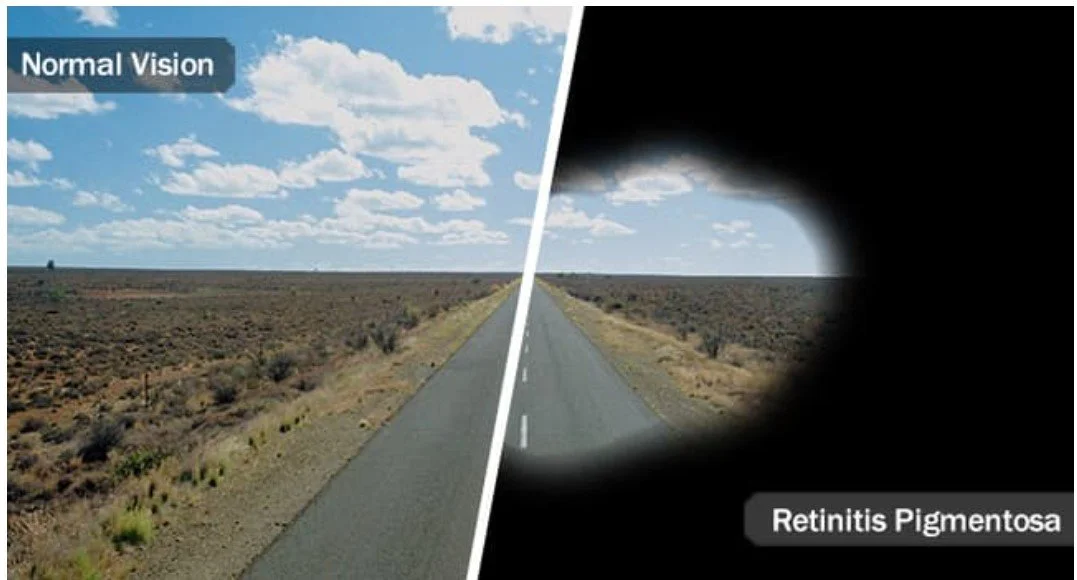Things Aren’t Always What They Appear To Be
As I looked out the sliding door, I could see you sitting there on the Adirondack chair. While one could assume that it was cold outside based on the fact that you had your hoodie on, hands in your pocket and hood up over our head, it was a balmy 54 degrees. I watched you for a minute or so as you continued to stare out into the backyard. No concern for where the dogs were. Just sitting. Staring. And then, that pang hit me. From being concerned, to feeling sad, and then worried. Finally, feeling embarrassed. Embarrassed that I didn’t want to ask you, “how are you doing?” for fear that your answer would be the same, “My eyes are shutting down.” You hadn’t been feeling good the past few days - pain in your head, your eyes very sensitive. I just didn’t know if I could take hearing something negative so early in the morning. I know…selfish!
Steve suffers from a degenerative eye disease called retinitis pigmentosa (RP). The National Eye Institute (NEI) defines RP as “a group of rare, genetic disorders that involve a breakdown and loss of cells in the retina — which is the light sensitive tissue that lines the back of the eye. Common symptoms include difficulty seeing at night and a loss of side (peripheral) vision.” This is an incurable disease which could ultimately result in becoming blind.
When I met Steve back in 2000, he was very active. He drove around a big truck, rode a motorcycle, played goalie for a local ice hockey team, weekend trips skiing, and he loved to weld in his spare time. We married in January 2005 and completed our move from Long Island, NY to North Carolina by July 2005. It was the offer to come on as an IT Manager at the Revlon plant in Henderson, NC that made the move possible for us. Fast forward two years. There was a restructure in Revlon’s IT department that ended in Steve’s layoff. I think it’s at this time that I started to notice signs of the disease. He started seeing a retina specialist to help manage the disease even though the signs of the disease were very slight.
When you look at Steve, he looks like an average guy. He can walk on his own. Eat on his own. Heck! He can even play video games (probably one of the only areas in life where he feels he still has some control). So it’s hard to think he’s got some type of deficiency going on. The image on the far right is what he sees compared to what you and I see on the far left. Unfortunately, as time goes on that field of view will become smaller and smaller.
Based on the narrowing of his vision, Steve decided to do two things. (1) Get a walking cane. This was really important as people get really angry when a seemingly healthy man bumps into their cart at the store. The walking cane is the sign that lets people know, “Hey. I’m low-vision or I don’t see well.” and (2) He decided to surrender his drivers license. As his wife, the added responsibility of having to drive him to doctor’s appointments, to the store, etc., etc. just seemed like, “Hey. I’m your wife and this is what I am supposed to do. It’s in our vows… in sickness and health.” But can you imagine what that does to a man who is used to doing things on his own? How does that play into his independence? I can only imagine the emotions he was feeling. The sense of helplessness. Feeling emasculated as a result of getting laid off, having an incurable disease where you now need to depend on someone to help do certain things for you or the mere fact that you can no longer function the way that you’re used to or do the things that you once loved to do.
Knowing what to say, knowing what to do isn’t always easy. Rather than ask the question, “How are you?” could I say something cheery or clever to help him get past a possible “bad” day. Possible bad day?? What am I saying?? The man is losing his vision! What could I possibly say to ease that pain? I opted to walk away and let him have his time. I went into my office and reflected on how much has changed since we were married. Things that you probably don’t even think twice about are things that we need to consider, like don’t leave your backpack in the middle of the floor because he won’t see it, will trip, and possibly get hurt or remember to put the garlic powder exactly where you took it from (where he remembers it last was) else it’ll take him forever to find it. Imagine not being able to enjoy a beautiful sunset because you just can’t distinguish the myriad of colors in the sky or notice the abundance of stars at night because you just can’t see them anymore. Such a mind fuck to someone with RP! Unfortunately, even after being with him for over 20 years, I still need to remind myself of these things. I am reminded of how difficult things are for him when he comes to bed. He sits on the edge of the bed, looking in my direction, trying to find me so that he can kiss me goodnight. Often times, I’ll call out so that he can follow my voice and find me. Sometimes he’s successful. Other times, he is not. In those moments, I’ll watch him. His eyes wide-opened. Scanning. Desperately trying to locate my face. It makes my heart sink as I hate seeing him struggle with something that you and I have no trouble doing.
We don’t go to the theater to watch movies anymore as things move too fast on the screen and he just can’t follow it. Not a total loss as the cost to watch movies these days is crazy. I, more than he, try to avoid crowded areas for it’s difficult to navigate through the crowd. Even with a walking cane. When choosing a restaurant for date night, the place has to be well lit or he cannot see the food on his plate. Cooking dinner requires planning. Otherwise, dinner will not be ready on time. He needs a big head start for prep because finding things in the kitchen is stressful. Even looking for milk in the refrigerator is a challenge. Computer work? A challenge as well. He needs to invert the colors and super-size his cursor. And even with those few aids in place, he can’t spend too much time on it as it results in terrible eye strain. He refers to it as “fry-balls”. All of these aforementioned things are constant reminders of activities he can longer do or do with ease. And so, these are things I think about when I see him sitting by himself, staring into nothing.
Disabilities are not always apparent to the naked eye. Some “invisible” disabilities include autism spectrum disorder, depression, diabetes, and learning and thinking differences such as ADHD and dyslexia. We tend to be more forgiving and understanding when we can see someone’s disability. But don’t be quick to judge others as things aren’t always what they appear to be! If you know of someone with a disability, show them some compassion. Even though they may be difficult to deal with or may come across as angry or aloof, rest-assured, there is always a story there. We may not be aware of the story or privy to what’s going on, but even if we were, we are not walking in their shoes. There’s only a small amount of truth when we say, “I understand what you’re going through.” But the fact of the matter is, we cannot truly understand the gamut of emotions they are going through as our physical make-up is different, our values are different, and the way we approach situations is different. Therefore, the way we respond to and feel about something is truly quite different. For those individuals we do not know, it is even more imperative to not be judgmental as we have no insight, whatsoever, to who they are as a person or what they’ve experienced in life. A kind gesture, a smile or a nod could be just the thing that makes that difference for them in that hour, in that minute or in that second. Be thankful for what you have today for tomorrow is promised to no one.
To learn more about retinitis pigmentosa and other retinal degenerative eye diseases visit the Foundation Fighting Blindness organization at: https://www.fightingblindness.org/



